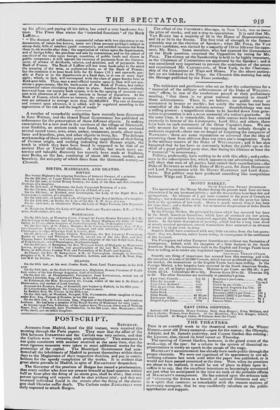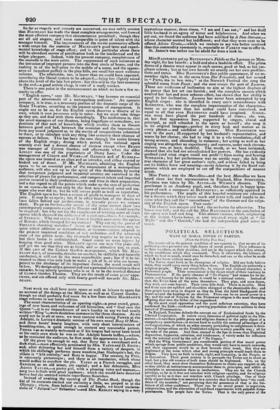THE THEATRES.
THIS is an eventful week in the theatrical world : all the Winter Houses—poor old Drury excepted--open for the Reason ; the Olympic, Adelphi, and St. James's yesterday, and Covent Garden this evening : the Lyceum, also, closed its brief career on Thursday. The opening of Covent Garden, however, is the grand event of the week—nay, of the year : for a reform in the system of theatrical re- presentations is surely an epoch in the annals of the stage. MACREADY'S announcement has already been made public through the proper channels. We were not cognizant of its appearance in our ad- vertising columns last week until after the paper was published, or it would not have passed unnoticed at the time. Now, when its promises are about to be realized, it would be out of place to dilate upon it : suffice it to say, that the excellent intentions so becomingly announced are just what we anticipated in the view we took of the probable effects of MACREADY'S management. He has entered upon the arduous task of "advancing the drama as a branch of national literature and art," in a spirit that contrasts so remarkably with the meaner motives of mercenary managers, that be may confidently calculate on the public approbation and support.
So far as tragedy and comedy are concerned, we may safely assume that MACREADY bus made the moat complete arrangements, and formed the most efficient company that circumstances permitted ; though they are all old stagers, and none comparable in point of talent with the manager himself. The improvement of the scenic accessories affords a wide scope for the exercise of MACREADY'S good taste and experi- mental knowledge of stage.effect ; and in this particular alone there will be abundant source of gratification both to the intellectual and the vulgar playgoer. Indeed, with the present company, completeness of the ensemble is the main point. The suppression of such nuisances as the intrusion of improper persons into the first circle of boxes, and the rushing in of the half-price in the middle of a scene, and the appear- ance of impudent puffery in the play-bilk, are small but most welcome reforms. The admission, too, is lower than we could have expected, considering the liberal system to be adopted,—being but slightly raised above the level of the late low prices : but this will be the best economy in the end—a good article cheap, is sure of a ready market.
There is one point in the announcement on which we have a few re- marks to offer.
" English opera," says Mr. MACREADY, " has become an essential
part of the amusement of a metropolitan audience." An operatic
company, it is true, is a necessary portion of the dramatic corps of the Great Theatres, according to the present system of management. It
ought not to be so, for the English opera deserves a theatre of its own, which it now possesses only in name : but we must take things as they are, and deal with them accordingly. The misfortune is, that the usual managers of our theatres, being tragedians or comedians, are destitute of that sort of knowledge which enables them to discern between good and bad, between the musician and the impostor—to
form any sound judgment as to the merits of compositions submitted to them, or to calculate with any thing like certainty their chances of success or failure. This has been the case through the entire history of the English stage ; during which period, the national opera scarcely ever had a decent chance of success except tt hell BEARD was manager of Covent Garden, and afterwards when the elder LINLEY was one of the proprietors of Drury Lane. Under the management of GIBBER and Wises—of GARRICK and of KLM BLE- the opera was treated as an alien and an intruder, and either starved or kicked out of doors. If Mr. MACREADY, admitting the English opera to be an essential part of the amusement of a metropolitan audience, will also act up to the spirit of this declaration, by seeing that competent judgment and impartial scrutiny are exercised in the selection of pieces for performance, and competent talent and impartial justice secured in their production—care and time in their preparation, and a due regard to all the points which make up the sum of perfection in an opera—he will not only he the first non-musical actor arid ma. nager who ever did so, but he will secure profit as well as reputation. The English opera has been a source of profit to managers in days of yore. It may be so again ; for, if in other branches of the drama we lave fallen behind our predecessors, in operatic power we surpass them. To go no further—the annals of the stage cannot show two contemporary composers equal to Drsitoa and Baum T, should novelty be required but why not try the t xperiment of reviving some of those operas which charmed the audieace s of a past age—tho-c, for example, Of SroaAca. Why not revive at COVt. t Garden once more the operas of Btslioe, which stamped Iris reputation? Why rot try the power of SHIELD'S charming tnelodies ? zs:orne of these composi:ions may re- quire either addition or retrenchment, or instrumentation adapted to the pre sent improved condition of our orchestras arid the advanced state of the public taste : the tiiiimoliels may require to be new•set, but their lustre is undiminished. Good music no mere injures by keeping than good wine. :Mozarer's operas are now tufty years old, and yet we see that they are as fresh, and us attractive too, as ever. If this I art of the Covent Garden management, which Mr. Al Ae- READY mu-t, of necessity, devolve on another, be skilfully and honestly conducted, it will not be the most unprofitable part ; but if it be in- trusted to those who only look to make a job of it, or who are incom- petent to the discharge of its important duties, the usual result will folio. We design only a general and not a personal observation in these remarks, being utterly ignorant who is or is to be the musical director of Covent Garden Theatre. They are the result of some years' expe- rience, and are offered only with hearty good-will towards Mr. MAC. READY.



























 Previous page
Previous page